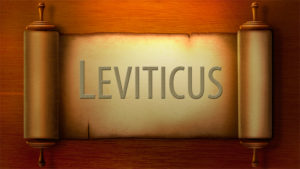 In the Bible, special occasions are built on periods of seven. This is the reason that the number seven takes on a special meaning. Usually this is interpreted as “divine completion”. Last week we saw the weekly pattern (Shabbat) and the monthly pattern: 1st month – Pesach; 3rd month – Shavuot; and 7th month – Sukkot. Shavuot occurs seven weeks after Pesach. Sukkot occurs seven months after Pesach. The Scripture section this week details the years being numbered in seven year periods for a Shabbat for the land. The land is not tilled but remains fallow in this year. Modern agriculture procedures incorporate this pattern to prevent the depletion of the soil. Finally seven periods of seven years (49 years) brings us to the “year of Jubilee” when the land returns to the family that it was originally allocated to. God declared that He owns the land and that the Israeli’s are “settlers” with Him (Leviticus 25:23). He also promised to walk in their midst (Leviticus 26:12). Because God declared that He owns the land, many today argue that it is sin to attempt to surrender sovereignty over any part of the land.
In the Bible, special occasions are built on periods of seven. This is the reason that the number seven takes on a special meaning. Usually this is interpreted as “divine completion”. Last week we saw the weekly pattern (Shabbat) and the monthly pattern: 1st month – Pesach; 3rd month – Shavuot; and 7th month – Sukkot. Shavuot occurs seven weeks after Pesach. Sukkot occurs seven months after Pesach. The Scripture section this week details the years being numbered in seven year periods for a Shabbat for the land. The land is not tilled but remains fallow in this year. Modern agriculture procedures incorporate this pattern to prevent the depletion of the soil. Finally seven periods of seven years (49 years) brings us to the “year of Jubilee” when the land returns to the family that it was originally allocated to. God declared that He owns the land and that the Israeli’s are “settlers” with Him (Leviticus 25:23). He also promised to walk in their midst (Leviticus 26:12). Because God declared that He owns the land, many today argue that it is sin to attempt to surrender sovereignty over any part of the land.
Leviticus 26 should be understood in relation to the blessing and curses stated in Deuteronomy and the covenant addendum (Deuteronomy 29). The Lord makes bold promises to Israel if they walk in obedience to the covenant. In addition, He gives awesome warnings if Israel rebels against God. There are four levels of discipline listed by the Lord; each becoming more and more severe (Leviticus 26:14-33). The ultimate discipline is dispersion from the land. These are provisions for Israel to occupy the land and do not have implications relative to God’s covenant relationship with Israel. In other words, Israel’s election is eternal without regard to their ability to hold the land of Israel.
Sometimes we get lost in the maze of regulation found in Leviticus. We need to back away and see the broader picture revealed in this book. In Exodus 25, immediately following the consummation of the covenant between God and His people, God instructed Israel to build a “Holy House” for His habitation. God said that He had brought Israel out of Egypt so that He could dwell in their midst (Exodus 29:46). This reveals an eternal purpose of God desiring to dwell in the midst of man. Exodus 40 records God moving into His “house” after Israel had completed it. Immediately following this event, God exhorted Israel to “approach” Him in His house. Basically, He is saying (in Kentucky farmer language) “y’all come to see me”. Five basic steps or approaches are outlined in the beginning chapters of Leviticus. These are usually seen as mechanical sacrifices viewed without symbolic meaning. Actually, these five steps to approach God represent the progressive steps of maturation in the life of a believer proceeding from the sin condition to complete consecration to God.
Following the steps of “approach” to God, we have the discussion of the issue of “clean and unclean” along with the list of prohibited practices. Basically, God is declaring that there are some limitations on the one who approaches. The one who approaches God cannot bring “death” with him. The Holy One of Israel if the “Living God” (Jeremiah 10:10) and will not permit death to be associated with Him in any way. Also there are a number of abominable social practices which God will not allow in His camp. This should speak volumes to America today.
Finally, God outlines the special occasions, His festivals, which reveal insight into the redemption process. We discussed these festivals last week.
With the threat of judgment leading to expulsion from the land, God indicated that, ultimately, He would gather His people back into His land. If Israel repented,
“Then I will remember My covenant with Jacob, and I will remember also My covenant with Isaac, and My covenant with Abraham as well, and I will remember the land”. (Leviticus 26:42)
A more complete statement of God’s intention to bring His people back to the Land after the exile is indicated in Deuteronomy 30:1-6.
The unconditional, eternal nature of God’s covenant with His people Israel is confirmed in spite of their sins leading to expulsion from the land.
“Yet in spite of this, when they are in the land of their enemies, I will not reject them, nor will I so abhor them as to destroy them, breaking My covenant with them, for I am the Lord their God.” (Leviticus 26:44)
Church theologians of the 2nd and 3rd centuries A.D. ignored statements like these concerning Israel. They concluded that God had severed relationship with Israel and had chosen the Church in its place. This is the unscriptural doctrine of “replacement theology” which is still common in Christian thought today.